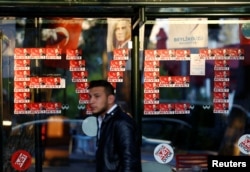Turkish expatriates in Europe are on edge ahead of Sunday's referendum in their homeland, troubled by diplomatic tensions and wide-ranging threats against "no" vote campaigners.
A "yes" vote in the constitutional balloting would give President Recep Tayyip Erdogan broad new powers, which supporters argue are needed to carry forward his program to develop Turkey. But opponents argue he is trying to establish a modern dictatorship in which he could retain power until at least 2029.
Tensions over the contest, which has evenly split Turkey's population, have spilled over to affect the millions of Turks living elsewhere in Europe. Many of them are eligible to vote and have already done so, with turnouts ranging from about 40 percent in Germany to roughly 60 percent in Belgium.
Mürvet Öztürk is an independent politician of Turkish descent with a seat in the regional parliament of Hessen. Of the 6 million people living in the German state, about 350,000 have Turkish roots.
Threats received
Öztürk said she received numerous threats after assuming an active role in the "no" campaign, fearing the extended powers sought by Erdogan would undermine democratic institutions in Turkey.
"We got online messages with some threats," she said. "But another threat came from a newspaper, Sabah, which is close to the ruling party. They wrote that people shouldn't talk to us and that we are traitors and that we are an enemy of the country. We started our campaign on the 15th of February and they published that on the 16th."
Öztürk, who has been active in the German-Turkish community for years, said the tensions were nothing new but that they had been exposed because of the polarizing campaign.
Similar anxiety has been felt in the Dutch-Turkish community, leading a local politician in Rotterdam to temporarily step back because of the many threats he was receiving.
Diplomatic friction
The campaign has also fueled diplomatic tensions, with several countries seeking to restrict Turkish politicians from campaigning for the referendum on their soil.
Dutch authorities in one case expelled a Turkish minister, worried that the campaigning would create unrest. The move angered Erdogan, who called the Dutch government "Nazi remnants." He also accused German Chancellor Angela Merkel of using Nazi tactics, saying at one point, "If Europe continues this way, no European in any part of the world can walk safely on the streets."
Even before the referendum, fears were running high in Europe among supporters of Fethullah Gulen, the exiled Turkish spiritual leader accused by Erdogan of being behind a failed coup that led to a purge against thousands of judges, civil servants and journalists.
In the Netherlands, Saniye Calkin, an open sympathizer with the Gulen-inspired Hizmet movement, said Turkish pressure on Hizmet followers began months before the failed coup and that the threats intensified afterward.
"Freedom and safety has gotten a new meaning to me since the failed coup," she said. "I can't really be free anymore because I can't put my loved ones in danger. I am a second-generation Dutch-Turk, but they are also going after my parents and my own kids. It's not just about the democracy in Turkey, but also the democracy here in Europe. "
Calkin said she thought it was important to still be visible and be a voice for Hizmet sympathizers, despite the risks.
"I haven't been back to Turkey for three years out of safety concerns," she said. "Turkish passports have been revoked of the people who can't come back to the Netherlands. And they were not even that actively involved with Hizmet."
Asylum in Belgium
In Belgium, authorities report a 120 percent increase in the number of asylum requests from Turks in the past eight months. Some of those people are represented by Walter van Steenbrugge, a Belgian lawyer who has filed numerous claims at the European Court of Human Rights.
"Financial rewards of up to 400,000 euros for some of my clients are promised if you arrest them and take them back to Turkey," he said. "With the upcoming referendum, when the presidential power can take over the power of the parliament and the death penalty might be reintroduced, these people are in danger. One of my clients even has permanent private security."
Van Steenbrugge is also representing Turkish companies, many of which have been deemed disloyal to the Turkish government and cannot access their funds in Turkey. An arbitration complaint has been filed with the World Bank in Washington with hundreds of millions of dollars at stake.







